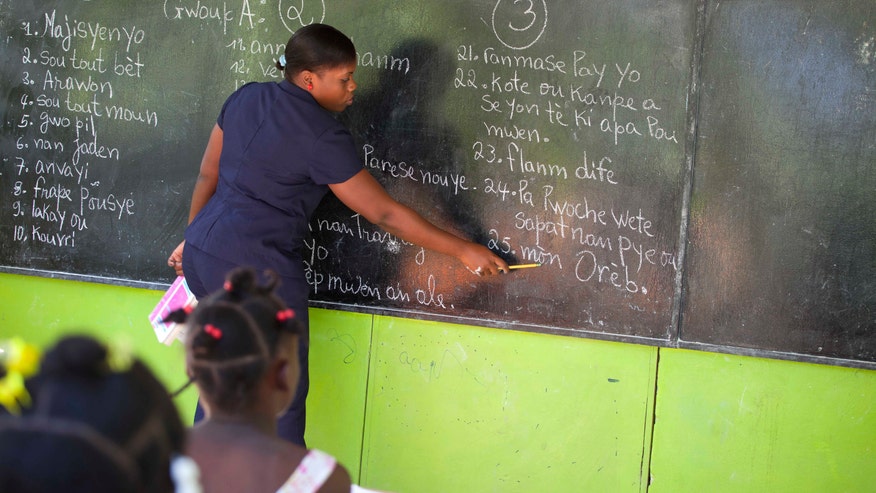3 “What If?” Scenarios For Haiti www.haitiantimes.com
July 24, 2015 •

By Ed Gehy
Regardless of what political views one may hold, or social class one may belong to, most would agree across the board Haiti has been for too long in its current situation, and that it is about time for real change to take place.
Haiti is faced with many challenges.
Governments come and go; yet, none of them have been able to bring about viable solutions to those challenges. Each passing administration seems to exacerbate the problems instead. It makes one wonder why Haiti wouldn’t invest its resources in areas where there’s a better potential for economic growth.
Below are three “what if?” scenarios for Haiti.
What if, Haiti implements a strong literacy program and Creole becomes the official language?

It is indisputable that one needs to be literate in order to take part and participate fully in societal activities. It requires one be literate in order to understand public issues and policies. It takes a country longer to develop when illiteracy is widespread throughout the nation.
Literacy also gives one the basic foundation upon which to be able to enter the labor market. Thus, literacy has a direct relation with how a country performs economically. Equally important is the relationship between language and reality.
Language, a tool that enables people to communicate, is essential to the development of a nation. After all, one way people can identify themselves with their country is through the language they speak.
How is it possible that the majority of the Haitian people speak Creole, while the government conducts its business in French as the country’s official language? How is it possible for us to talk and debate on the marginalization and disenfranchisement of the masses, while we promote a language the latter does not understand?
It should not be surprising to anyone that adopting French as the official language in Haiti has not been proven to be beneficial for the country by any stretch of the imagination. If anything, Haiti suffers culturally and commercially, as a result of being a Francophone country.
In light of the fact culture and language are closely related, given language is an inseparable part of a people’s culture. It is undeniably true that Haiti would be better off replacing the language of its former colonial master with that of its ethnic roots.
What if, the three powers of government were truly independent of each other?
Historically, Haiti’s citizenry hasn’t had faith in their governments. They normally do not trust their representatives and have little faith in their legal system. This sentiment is undoubtedly filtered down from generation to generation.
In the past, the ascension to the presidency did not occur as a result of direct elections by the people. Instead, heads of state were chosen by the National Assembly, commonly known as the Chamber of Representatives.
As can be imagined, partisanship was highly prevailing. And such political favoritism would normally continue as though the newly-elected president was almost under a sacred obligation to return the favor by giving kickbacks, endless opportunities, and impunity to his acolytes.
This type of political maneuvering is common in every corner of the public sector; it is as prevalent in the legislative as it is in the judicial branch. The executive branch would control everything and has unquestioned power. The idea of check and balances, which is quintessential for any democracy to function, has been almost nonexistent in Haiti, hence, the root cause of corruption in Haiti.
For the country to recover and get back to its old glory days there must be a true separation of the three powers so that they can function independently of each other. It is not just ideological, but universal that agricultural production is crucial for any country to survive.
What if, Haiti promotes sustainable agriculture and self-sufficiency?

A country’s most basic obligation is first and foremost being able to feed its people. Being able to produce not only enough for consumption at home, but also enough to export abroad, commonly referred to as a trade surplus, is a key characteristic of a developed or even developing country.
For the past twenty years, Haiti has experienced a growth in population by passing from eight to 10 million people. As can be expected, any country that is not capable of meeting the demands of such growth by not being able to produce enough, will have no other choice but to rely on foreign markets for its basic needs. And this has been exactly the case of Haiti for too long now.
According to the International Monetary Fund, Haiti’s trade deficit increased significantly over the last two decades, while exports were mostly unchanged. Imports of goods increased from 23 percent of GDP in 1980-1984 to 43 percent of GDP in 2010-2013. When you import more than you export, that will unavoidably affect the country’s balance of Trade, which ultimately affects its currency.
After so many failed attempts at finding a way out, and time wasted in political bickering and pondering over ways to find lasting solutions to the country’s problems, one’s got to realize something is fundamentally wrong with the old ways of thinking; that wishful thinking and empty rhetoric can not and will not solve the multi-faceted problems Haiti has had to face throughout its history.
It is about time to embrace conventional wisdom. It would be insane to do the same thing over and over and expecting a different result. The politicians, decisions makers, international organizations might start seeing things from a different angle if they were to look at the problems as they are, which ultimately would help pinpoint the root cause of them, instead of the other way around. That said, instead of deductive reasoning, perhaps, it might be worthwhile to be engaged in inductive reasoning. That, in and of itself, would be a start.